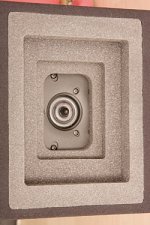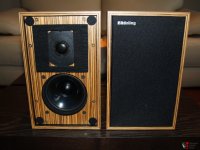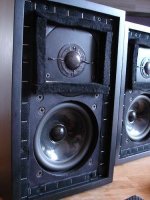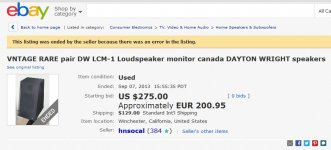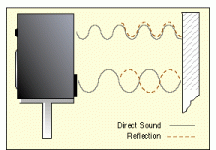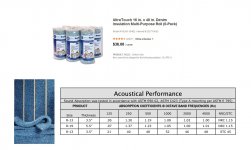I have a pair of Dayton Wright LCM-1's that I purchased probably 30 yrs ago from a Hi-End Audio store. They were less expensive than many of the speakers they carried but to be honest it's so long ago I don't remember how much I paid but I think it was around $600-$700 for the pair.
We moved and I haven't used them in a while. I did have to replace one of the woofers about 6 yrs ago. A royal PITA with the insulation etc.
I have some questions:
1. How do these spks rate in today's world?
2. Do I NEED to have the insulation on them? I have a lung condition and would prefer to get rid of the fiberglass if possible.
3. If these are sub-par has anyone upgraded the drivers and/or X'over?
4. If they're on the low end of the scale I wouldn't mind recommendations on "assembling" a new pair of speakers. I really don't want to get involved in speaker cabinet making or x'over design. That is best left to someone who can do a stellar job at it. I used to be in electronics so I have no problem with assembly, soldering, etc.
Thank you.
We moved and I haven't used them in a while. I did have to replace one of the woofers about 6 yrs ago. A royal PITA with the insulation etc.
I have some questions:
1. How do these spks rate in today's world?
2. Do I NEED to have the insulation on them? I have a lung condition and would prefer to get rid of the fiberglass if possible.
3. If these are sub-par has anyone upgraded the drivers and/or X'over?
4. If they're on the low end of the scale I wouldn't mind recommendations on "assembling" a new pair of speakers. I really don't want to get involved in speaker cabinet making or x'over design. That is best left to someone who can do a stellar job at it. I used to be in electronics so I have no problem with assembly, soldering, etc.
Thank you.
Somebody else with a pair,mine aren't being used either.They were well regarded in their day similar drive units to the Spica TC50 but a larger cabinet.I was surprised that there was still gas in the bag inside after all this time!
It's been a number of years since I replaced the woofer but I don't remember a bag inside the cabinet. Maybe mine are older? I think the S/N is something like 0019XX.
(2) For a sealed speaker you don't need to change the insulation because it doesn't affect outside air. Unless... you open and close the speaker enclosure every other day, for maintenance, crossover, other. There are other similar types with same (very close) specs like rock wool. Other types would be wool or (made of) cotton/synthetic materials.
Visaton 5069 | Lambs Wool
The Madisound Speaker Store
Insulation - Vicoustic - Acoustics & Furniture
Cabinet Damping Material in the Speaker Components Department at Parts Express | 311
Ljudisoleringsfilt - Biltema
if on the front of the baffle proceed with the same materials (above). I would use some of the Acoustic Sound Damping Foam 1-1/2" x 24" x 18" UL 94 type.
Visaton 5069 | Lambs Wool
The Madisound Speaker Store
Insulation - Vicoustic - Acoustics & Furniture
Cabinet Damping Material in the Speaker Components Department at Parts Express | 311
Ljudisoleringsfilt - Biltema
if on the front of the baffle proceed with the same materials (above). I would use some of the Acoustic Sound Damping Foam 1-1/2" x 24" x 18" UL 94 type.
Last edited:
I actually have a bale of Ultra Touch Cotton insulation that I've used for some PA cabinets. On the LCM-1's I was thinking of just leaving the insulation off the Outside of the cabinets. Seems strange to design a cab with insulation on the outside held in place by the grill cloth. Does anyone know if it actually serves a purpose, maybe to dampen some high's? ?
The Ultra Touch does seem to tighten up the bass on PA speakers a bit and you have the added safety of not breathing in fiberglass when they thump.
I'm still interested if anyone has compared the LCM-1 to any more modern cabinets?
The Ultra Touch does seem to tighten up the bass on PA speakers a bit and you have the added safety of not breathing in fiberglass when they thump.
I'm still interested if anyone has compared the LCM-1 to any more modern cabinets?
It's a consequence of the design. Many monitors are treated in the same way, if for different effects. You find that in the studio monitors not the home brew. Lipinski Sound, BBC LS3/5A, others.Does anyone know if it actually serves a purpose, maybe to dampen some high's? ?
Note: it's possible to cancel some nulls, as an option of it's use/practicability...
Lipinski Sound L-707 loudspeaker | Stereophile.com
LS3/5A Kingswood Warren
Attachments
Last edited:
It's obvious you are not talking about the price, but about it's use. A lot of people are using BBC LS3/5A's also, nowadays and out of the studio environment, or just adding a subwoofer, for retro sound and retro quality drivers there's nothing better, including smooth Bextrene or paper cones, silk dome tweeters, anyway (ebay price)...1. How do these spks rate in today's world?
Attachments
I thought that the plastic bag of hexafluoride gas inside was an integral part of the design,I will check the serial numbers on mine though.
I was considering the hypothesis of the front baffle treatment being the result of one particular problem but it's obvious that, and after reading the (author of the) Dayton Wright papers and studio/main speaker placement articles, you don't want a speaker front baffle to be very reflective, in any way, and some are also spheres like Elipson, B&W and others (DIY), in the case of this small monitor with a complex pattern of reflective waves from the room ceiling that some say are very warm/cozy, I could notice this effect previously with other speakers, the mechanics of the room acoustics will be adding reflections from the walls and ceiling (and floor) and reflecting them by the more or less reflective surface of the speaker.
Dayton-Wright.com
MONITOR PLACEMENT
Dayton-Wright.com
MONITOR PLACEMENT
Attachments
I sent an email to Dayton Wright asking if I could remove the insulation altogether without drastically changing the characteristics of the speakers or replace the insulation with Ultratouch cotton insulation since I don't want to breath in fiberglass. So far I have not received an answer but it's only been one day.
If it's this one Ultra Touch, Cotton Insulation - Recycled, High Performance - Green Building Supply it's very nice.
It's only a little bit thick (R13) 3.5"/89mm, what about half that thickness, can you do it by hand?!
http://www.greenbuildingsupply.com/...2953&c=772072&h=8158097f2c96daf3f105&_xt=.pdf
note: if you place your ears against the surface you can feel very quiet (no noise/absorption).
It's only a little bit thick (R13) 3.5"/89mm, what about half that thickness, can you do it by hand?!
http://www.greenbuildingsupply.com/...2953&c=772072&h=8158097f2c96daf3f105&_xt=.pdf
note: if you place your ears against the surface you can feel very quiet (no noise/absorption).
Attachments
Last edited:
Yes, that's what I have. I purchased it locally in a large bail. It's not too difficult to work with, can be cut with a sharp pair of scissors, and holds rather well with some spray contact adhesive.
If it's this one Ultra Touch, Cotton Insulation - Recycled, High Performance - Green Building Supply it's very nice.
It's only a little bit thick (R13) 3.5"/89mm, what about half that thickness, can you do it by hand?!
http://www.greenbuildingsupply.com/...2953&c=772072&h=8158097f2c96daf3f105&_xt=.pdf
note: if you place your ears against the surface you can feel very quiet (no noise/absorption).
This is the R-6.7 batts, 2" thick material. Most users report it does not fluff up more than 1.25".
Same material but mine is packaged differently and is over 3" thick. You can cut it down with scissors or a bread knife to get a thinner layer.
Mike Wright is well into his 80's , not sure if you'll get an answer. The insulation was to control dispersion, better if you try an alternate foam or felt pads if the current insulation material bothers you.
Last edited:
I would hope it is thicker, it's R19 😉
Finding that stuff here is proving mail order seems to be the only choice. Home Depot leaves alot to be desired Search Results for Ultratouch at The Home Depot
Finding that stuff here is proving mail order seems to be the only choice. Home Depot leaves alot to be desired Search Results for Ultratouch at The Home Depot
I purchased mine from a distributor near Dallas,TX. It's 16" wide >3" thick with serrated edges on two sides and if memory serves me (the rest is in the attic now still bundled) it was around $45 for the bundle and would cover somewhere between 30-40sq.ft.
From what I've read, when used inside a cabinet, it's supposed to tighten up the bass and extend the lower frequencies slightly because of the added "air pockets". This, allegedly, makes the cabinet appear to be larger than it is, hence more bass. I've used it in some PV12M's and A/B'd one with and without. The one with the Ultra Foam did sound better but it wasn't night and day. My main reason for using it was to avoid Fiberglass every time a speaker thumps! I also used it in a very old pair of EV S12-2's with upgraded speakers and it seemed to fair well. Much better than just removing the fiberglass insulation and having nothing in there.
From what I've read, when used inside a cabinet, it's supposed to tighten up the bass and extend the lower frequencies slightly because of the added "air pockets". This, allegedly, makes the cabinet appear to be larger than it is, hence more bass. I've used it in some PV12M's and A/B'd one with and without. The one with the Ultra Foam did sound better but it wasn't night and day. My main reason for using it was to avoid Fiberglass every time a speaker thumps! I also used it in a very old pair of EV S12-2's with upgraded speakers and it seemed to fair well. Much better than just removing the fiberglass insulation and having nothing in there.
The fiber finess / density (1-3") of Ultratouch is a very good match for dampening TL/BR/Sealed enclosures and breaks up the standing waves. Nothing magic about the stuff, just works a bit better than ages old material, like rockwool, fiberglass, cotton and wool that's normally used.
Planned on making absorption/diffraction panels for my space with some too.
Microfiber towels work very well also. Weighed three MF hand towels the other day in new to very used condition. Difference in weight was 3grams of dirt, dispite all being "clean". Only way to really get them really clean is with a pressure washer. 1000psi is more than enough.
Planned on making absorption/diffraction panels for my space with some too.
Microfiber towels work very well also. Weighed three MF hand towels the other day in new to very used condition. Difference in weight was 3grams of dirt, dispite all being "clean". Only way to really get them really clean is with a pressure washer. 1000psi is more than enough.
- Status
- Not open for further replies.
- Home
- Loudspeakers
- Multi-Way
- Dayton Wright LCM-1 -Upgrade, Improve, Replace?
